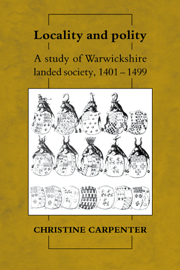Book contents
- Frontmatter
- Contents
- List of figures and tables
- Preface
- List of abbreviations
- Note on text
- 1 Introduction
- PART I STRUCTURAL
- PART II CHRONOLOGICAL
- 9 Social and political networks 1401–50
- 10 Warwickshire under Richard Beauchamp: 1401–39
- 11 The interregnum: 1439–49
- 12 The period of crisis I: Warwickshire under the Kingmaker: 1449–61
- 13 The period of crisis II: Warwickshire under the Kingmaker and the duke of Clarence: 1461–78
- 14 The period of crisis III: Warwickshire under the crown: 1478–85
- 15 The period of crisis IV: Warwickshire under the crown: 1485–99
- 16 Politics and society c. 1449–1500
- 17 Conclusions
- Appendices
- Bibliography
- Index
12 - The period of crisis I: Warwickshire under the Kingmaker: 1449–61
Published online by Cambridge University Press: 27 October 2009
- Frontmatter
- Contents
- List of figures and tables
- Preface
- List of abbreviations
- Note on text
- 1 Introduction
- PART I STRUCTURAL
- PART II CHRONOLOGICAL
- 9 Social and political networks 1401–50
- 10 Warwickshire under Richard Beauchamp: 1401–39
- 11 The interregnum: 1439–49
- 12 The period of crisis I: Warwickshire under the Kingmaker: 1449–61
- 13 The period of crisis II: Warwickshire under the Kingmaker and the duke of Clarence: 1461–78
- 14 The period of crisis III: Warwickshire under the crown: 1478–85
- 15 The period of crisis IV: Warwickshire under the crown: 1485–99
- 16 Politics and society c. 1449–1500
- 17 Conclusions
- Appendices
- Bibliography
- Index
Summary
The year 1449 was a watershed for Warwickshire, in that it saw the end of ten years of minorities and the arrival of the Kingmaker, Richard Neville, earl of Warwick, but it also marks a significant change in the nature of English politics in the fifteenth century. In October, the surrender of Rouen signalled the end of English rule in France and the next year there followed retribution on the men held responsible for this failure, Suffolk and his fellow courtiers. For the whole of the ensuing decade there was never any certainty about who was to have the rule of England, and, once confrontation had degenerated into open conflict in 1455, security became an even scarcer commodity. Nor did a great deal of certainty arrive with Edward IV in 1461; it took him four years to deal with the north and to capture his predecessor, who, as a crowned and anointed monarch, was not a rival to be taken lightly. Within two years of achieving this measure of security he was facing a deterioration in his relations with the earl of Warwick which led eventually to Edward's hurried departure in 1470 and the Readeption of Henry VI. With the death of Warwick at Barnet, of Prince Edward at Tewkesbury and of Henry VI soon after and the birth of two healthy sons to Edward IV, all doubts about the future should have been at an end, but Richard of Gloucester's appalling mishandling of his brother's legacy put the body politic back into ferment all over again.
- Type
- Chapter
- Information
- Locality and PolityA Study of Warwickshire Landed Society, 1401–1499, pp. 437 - 486Publisher: Cambridge University PressPrint publication year: 1992



